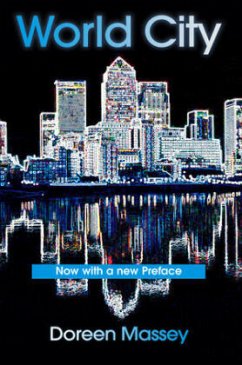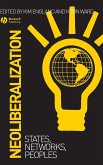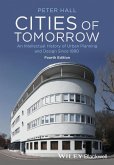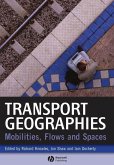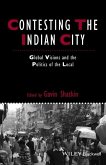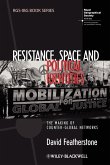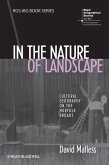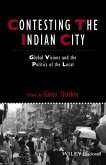Cities around the world are striving to be 'global'. This book tells the story of one of them, and in so doing raises questions of identity, place and political responsibility that are essential for all cities.
World City focuses its account on London, one of the greatest of these global cities. London is a city of delight and of creativity. It also presides over a country increasingly divided between North and South and over a neo-liberal form of globalisation - the deregulation, financialisation and commercialisation of all aspects of life - that is resulting in an evermore unequal world.
World City explores how we can understand this complex narrative and asks a question that should be asked of any city: what does this place stand for?
Following the implosion within the financial sector, such issues are even more vital. In a new Preface, Doreen Massey addresses these changed times. She argues that, whatever happens, the evidence of this book is that we must not go back to 'business as usual', and she asks whether the financial crisis might open up a space for a deeper rethinking of both our economy and our society.
Hinweis: Dieser Artikel kann nur an eine deutsche Lieferadresse ausgeliefert werden.
World City focuses its account on London, one of the greatest of these global cities. London is a city of delight and of creativity. It also presides over a country increasingly divided between North and South and over a neo-liberal form of globalisation - the deregulation, financialisation and commercialisation of all aspects of life - that is resulting in an evermore unequal world.
World City explores how we can understand this complex narrative and asks a question that should be asked of any city: what does this place stand for?
Following the implosion within the financial sector, such issues are even more vital. In a new Preface, Doreen Massey addresses these changed times. She argues that, whatever happens, the evidence of this book is that we must not go back to 'business as usual', and she asks whether the financial crisis might open up a space for a deeper rethinking of both our economy and our society.
Hinweis: Dieser Artikel kann nur an eine deutsche Lieferadresse ausgeliefert werden.
"World City is that rarest of commodities: a geographic text that is, at one and the same time, both theoretically astute, politically insistent and publicly accessible." -- Phil Hubbard, Area book review forum
"A brave and worthwhile attempt at creating a 'public geography', an effort to take insights developed during a career in our discipline to wider audiences. The book is written in a wonderfully open and accessible manner, using language that is neither wilfully exclusionary nor obscure." -- Sarah Holloway, Phil Hubbard, Heike Jons, Liz Mavroudi and Pat Noxolo, Area book review forum
"A fascinating insight into London and the politics of place, highlighting not only the social and economic geographies which result but also the questions of moral responsibility world city status implies." -- New Zealand Geographer
"A fascinating read. Through her distinctive analytical lens, Massey has produced a masterpiece on the politics of what it means to be a 'world city'." -- Economic Geography Research Group
"World City is well worth pondering, beyond even the question of equity or, more succinctly, of growth with social justice. The time has come for a new politics of development based on a logic other than the logic of markets and unlimited accumulation, in short, for a human and Earth-centred development in which the quality of life and of the Earth's eco-systems move to centre stage." -- John Friedmann, Urban Studies
"There are more than seven million Londoners now, and more to come. Massey's work suggests that there is also more than one London." -- Fran Tonkiss, British Journal of Sociology
"An important intervention into the rich literature on globalization and cities, a dimension of global social relations to which International Relations scholars would do well to pay much greater attention." -- International Studies Review
"Written in an accessible style, free of academic jargon ... a text that students should read." -- Geography
"A brave and worthwhile attempt at creating a 'public geography', an effort to take insights developed during a career in our discipline to wider audiences. The book is written in a wonderfully open and accessible manner, using language that is neither wilfully exclusionary nor obscure." -- Sarah Holloway, Phil Hubbard, Heike Jons, Liz Mavroudi and Pat Noxolo, Area book review forum
"A fascinating insight into London and the politics of place, highlighting not only the social and economic geographies which result but also the questions of moral responsibility world city status implies." -- New Zealand Geographer
"A fascinating read. Through her distinctive analytical lens, Massey has produced a masterpiece on the politics of what it means to be a 'world city'." -- Economic Geography Research Group
"World City is well worth pondering, beyond even the question of equity or, more succinctly, of growth with social justice. The time has come for a new politics of development based on a logic other than the logic of markets and unlimited accumulation, in short, for a human and Earth-centred development in which the quality of life and of the Earth's eco-systems move to centre stage." -- John Friedmann, Urban Studies
"There are more than seven million Londoners now, and more to come. Massey's work suggests that there is also more than one London." -- Fran Tonkiss, British Journal of Sociology
"An important intervention into the rich literature on globalization and cities, a dimension of global social relations to which International Relations scholars would do well to pay much greater attention." -- International Studies Review
"Written in an accessible style, free of academic jargon ... a text that students should read." -- Geography

